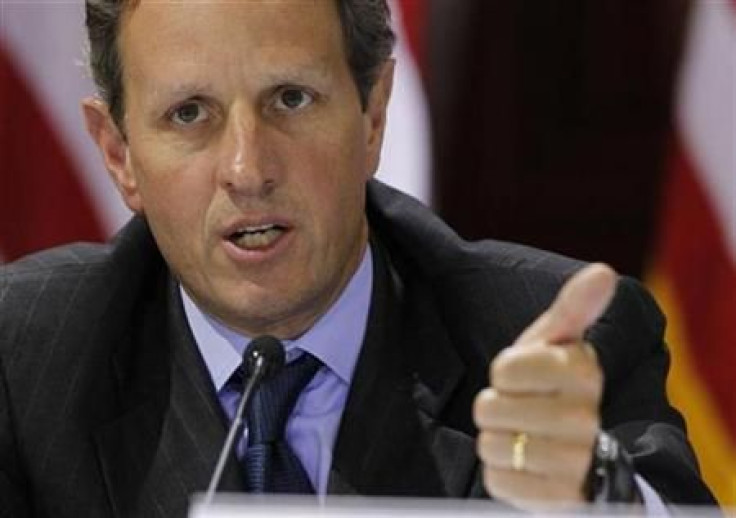Treasury Secretary: US Will Go Over Fiscal Cliff If Republicans Insist On Tax Cuts For Wealthy

According to Treasury Secretary Timothy Geithner, there is one major problem with the congressional Republican leadership’s plan to extend the Bush tax cuts for the wealthy while also averting the so-called fiscal cliff: The nation absolutely cannot afford it.
When asked, during an appearance on "Fox News Sunday," whether it was possible to avoid the mix of automatic spending cuts and tax increases scheduled to go into affect in January, Geithner insisted it was – but only if Republicans allowed the lower marginal tax rate for the wealthy to expire.
“That is a decision that lies in the hands of the Republicans, that are now opposing increases in tax rates. If they recognize the reality, that we cannot afford to extend the tax rates, we have the basis for an agreement that would be good for the American people,” Geithner said, when asked if he could “promise” the nation will not go over the cliff.
“Why does it make sense for the country to force tax increases on all Americans, because a small group of Republicans want to extend tax rates for 2 percent of Americans — why does that make any sense?” Geithner continued.
President Barack Obama has insisted he would not agree to any deficit deal that does not raise taxes on the highest-earning Americans. Democrats want to extend the Bush tax rates for middle-class families, while allowing the current lower rates to expire for those with income over $250,000 – about 2 percent of households.
Republicans, however, say they want to extend those tax cuts for all income brackets, while closing loopholes and certain deductions in the tax code to generate additional revenue.
On Thursday, the Treasury secretary laid out the Obama administration’s proposal for averting the cliff, which included $1.6 trillion in tax increases and $400 billion in cuts to entitlement spending. Geithner stressed that’s on top of the “trillion dollars in spending cuts we agreed with Republicans, last year, on defense and a range of other government programs.”
House Speaker John Boehner, R-Ohio, rejected the administration’s plan as “not a serious proposal” and said negotiations were currently at a “stalemate.”
In November the Congressional Budget Office offered a sober assessment of the economic implications of going off the "fiscal cliff," reporting the sudden combination of tax increases and spending cuts would lead to a rise in unemployment and potentially put the nation into a short-term economic recession.
© Copyright IBTimes 2024. All rights reserved.











